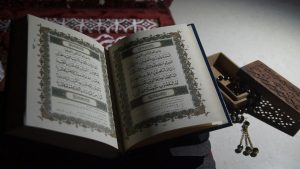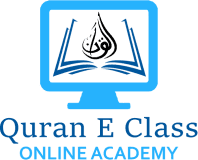Quranic Science and Knowledge: A Divine Exploration
February 29, 2024 2025-08-13 11:17Quranic Science and Knowledge: A Divine Exploration
Quranic Science and Knowledge: A Divine Exploration
The Quran, revealed to the Prophet Muhammad (peace be upon him) over 1,400 years ago, transcends mere religious scripture. It serves as a beacon of guidance for humanity, encompassing not only matters of faith but also profound insights into the natural world. Here are some remarkable ways in which the Quran acknowledges scientific principles:
1.1. Embryology: A Divine Blueprint
The Quran describes the development of the human embryo with astonishing precision. In Surah Al-Mu’minun (23:12-14), it outlines the stages of creation, from the initial “nutfa” (drop of fluid) to the formation of bones and flesh. Modern embryology confirms these stages, emphasizing the intricate process of cellular differentiation and organogenesis.
1.2. Mountains as Stabilizers
In Surah An-Naba’ (78:6-7), the Quran refers to mountains as “pegs” that stabilize the Earth’s crust. Geologists now recognize that mountains play a crucial role in maintaining tectonic stability. The Quranic insight predates modern scientific understanding.
1.3. Water Cycle: A Divine Choreography
The Quran eloquently describes the water cycle, emphasizing evaporation, condensation, and precipitation. In Surah Al-Hijr (15:22), it states, “And We send down from the sky water in measured amounts.” This understanding predates modern hydrological science by centuries.
1.4. Cosmic Expansion: The Big Bang
Surah Adh-Dhariyat (51:47) alludes to the expansion of the universe: “And the heaven We constructed with strength, and indeed, We are [its] expander.” This concept aligns with the Big Bang theory, which posits an initial cosmic singularity followed by rapid expansion.
1.5. Invitation to Reflect
The Quran repeatedly invites humanity to ponder the natural world. Verses such as “We will show them Our signs in the horizons and within themselves until it becomes clear to them that it is the truth” (Quran, 41:53) emphasize observation, contemplation, and scientific inquiry.
2. The Quran and Knowledge: Illuminating Minds
2.1. The Quest for Knowledge
The Quran elevates knowledge as a noble pursuit. It encourages seeking knowledge across various domains, including religious, scientific, and practical realms. The Prophet Muhammad (peace be upon him) emphasized the importance of acquiring knowledge throughout one’s life.
2.2. The Pen and the First Revelation
The very first word revealed to Prophet Muhammad was “Iqra” (Read). This underscores the significance of literacy, education, and intellectual growth. The Quran acknowledges the power of the written word and encourages literacy.
2.3. The Light of Knowledge
Metaphorically, the Quran refers to itself as “light.” Just as light dispels darkness, knowledge illuminates ignorance. The pursuit of knowledge leads to enlightenment and a deeper understanding of God’s creation.
3. Quranic Verses Related to Science and Knowledge
3.1. Ayat al-Kursi (The Throne Verse)
Ayat al-Kursi (Quran, 2:255) stands as a majestic declaration of God’s sovereignty. Its profound words resonate across time and space, encapsulating divine knowledge that spans the cosmos. Here are its key aspects:
- Comprehensive Knowledge: Ayat al-Kursi asserts that God knows everything in the heavens and the Earth. From the vast galaxies to the tiniest subatomic particles, divine awareness encompasses all.
- The Throne of God: The verse refers to the “Throne” (Arsh) as a symbol of divine authority. It represents the cosmic order and governance. God’s knowledge extends beyond creation, encompassing the very fabric of existence.
- Universality and Depth: Scholars have marveled at the depth of Ayat al-Kursi. Its concise yet profound message invites contemplation. Whether pondering the intricacies of quantum physics or the mysteries of black holes, this verse reminds us of the limitless knowledge of the Creator.
3.2. Surah Al-Alaq (The Clot)
Surah Al-Alaq (Quran, 96) opens with the command “Read” (Iqra). This divine injunction emphasizes the transformative power of knowledge:
- The First Revelation: The word “Iqra” marked the beginning of Prophet Muhammad’s mission. It highlights the importance of literacy, education, and intellectual curiosity. The pursuit of knowledge is central to Islam.
- The Clot of Blood: The subsequent verses describe the creation of humans from a “clot” (Alaq). Modern science recognizes this stage as the initial development of the embryo. Surah Al-Alaq acknowledges the intricate process of life’s inception.
- Education and Society: By emphasizing reading, Surah Al-Alaq underscores the role of education in shaping individuals and societies. It encourages lifelong learning and the dissemination of knowledge.
4. The Quran as a Source of Knowledge
4.1. Divine Revelation
Muslims hold the Quran in profound reverence, considering it the ultimate revelation from God (Allah). Here’s why the Quran is regarded as an unparalleled source of knowledge:
- Spiritual Guidance: The Quran provides spiritual nourishment, guiding believers toward righteousness, compassion, and devotion. Its verses offer solace, hope, and a connection to the divine.
- Ethical Framework: Within its pages, the Quran outlines ethical principles that govern human conduct. It emphasizes honesty, justice, kindness, and empathy. These timeless values shape individual character and societal norms.
- Legal Precepts: The Quran contains legal injunctions (known as “Sharia”) that cover various aspects of life, including family law, contracts, and criminal justice. Scholars derive legal rulings (fiqh) from its verses.
- Historical Narratives: The Quran recounts stories of past prophets, nations, and events. These narratives provide moral lessons, emphasizing perseverance, faith, and accountability.
4.2. Multidisciplinary Insights
The Quran transcends religious boundaries, offering insights across diverse domains:
- Astronomy: The Quran refers to celestial bodies, orbits, and cosmic order. Verses like “And the heaven We constructed with strength” (Quran, 51:47) resonate with modern astrophysics.
- Biology: The Quran acknowledges the intricate creation of living beings. Surah Al-Mu’minun (23:12-14) describes embryonic development, aligning with contemporary embryology.
- Ethics: The Quran outlines moral guidelines, emphasizing compassion, honesty, and social responsibility. It encourages fair trade, charity, and kindness.
- Social Justice: The Quran champions justice, advocating for the rights of the oppressed, orphans, and marginalized. It calls for equitable distribution of wealth.
- Environmental Stewardship: The Quran portrays nature as a sign of God’s existence. It urges responsible stewardship of the Earth (Quran, 30:41).
In embracing these multidisciplinary insights, believers find harmony between faith and reason. The Quran invites critical thinking, reflection, and a holistic understanding of existence.
5. The Quran: A Living Legacy
5.1. Spiritual Enlightenment
The Quran transcends time and space, offering solace, guidance, and spiritual enlightenment. Its verses resonate with believers across generations, providing comfort during trials and inspiring acts of compassion. The Quranic calligraphy adorning mosques and homes serves as a visual reminder of its eternal wisdom.
5.2. Interdisciplinary Dialogue
Scholars, scientists, and thinkers engage in interdisciplinary dialogues, exploring the Quran’s relevance to contemporary challenges. Whether discussing bioethics, environmental stewardship, or cosmology, the Quran remains a catalyst for thought-provoking conversations.
5.3. Personal Transformation
Individuals who immerse themselves in the Quran experience personal transformation. Its verses inspire self-reflection, resilience, and empathy. Through prayer and recitation, hearts are softened, and minds are awakened.
In this intricate tapestry of faith and knowledge, the Quran continues to illuminate minds, shape societies, and bridge the gap between the seen and the unseen. As we seek knowledge, let us embrace the Quran’s timeless message—a beacon guiding us toward truth, compassion, and purpose.
This article written by QuranEclass









